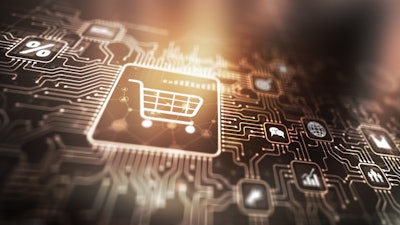
E-procurement is booming: businesses are flocking to online platforms to buy goods and services, pushing sales past the $1 trillion mark in 2022. It's no surprise – e-procurement offers speed, accuracy and a competitive edge in today's turbulent market.
However, e-procurement still represents just 7.4% of all B2B sales. While 91% of procurement teams prefer buying online, it's evident that e-procurement alone isn't enough.
The future lies in connected commerce, a strategy that seamlessly integrates e-procurement with e-commerce solutions. This creates a more efficient and resilient buying experience, covering the entire digital procurement journey.
The power of connected commerce
The advantages of e-procurement are clear. But while e-procurement is undoubtedly a powerful tool, it is only one side of the B2B coin. Buyers and sellers, despite sharing the goal of swift and successful deals, often have vastly different needs and workflows. As a result, even the most advanced e-procurement system may fall short of a smooth and mutually beneficial sales journey — unless it’s paired with a digital commerce platform that can create an end-to-end purchasing experience that satisfies stakeholders on both sides of the transaction.
This approach has been a game-changer for companies like Electrical Equipment Company (EECO), a midsized electrical distributor, which reported a five-fold revenue increase after integrating its customers’ digital procurement systems with its own e-commerce platform.
Here's how connected commerce benefits both buyers and sellers:
Streamlined processes: Imagine dramatically faster purchase order and invoice management. Connected commerce automates these tasks, eliminating manual data entry and reducing errors. A recent TradeCentric study showed organizations can operate up to 80% faster with automation, freeing up procurement teams for more strategic tasks like supplier relationships and contract negotiations.
Data synchronization: Connected commerce ensures critical information like inventory levels, purchase orders, and invoices are consistent and up-to-date across all systems. Say goodbye to data silos and manual reconciliation, and hello to reduced delays, discrepancies and financial risks.
Overcoming integration challenges
Connecting e-procurement and e-commerce isn't without its hurdles. Integrating diverse systems, workflows and data formats can be complex, especially for organizations relying on legacy or custom-built solutions. This often requires specialized technical expertise in data mapping, API integrations and security protocols, which can be costly and time-consuming to acquire.
So how can businesses overcome these integration challenges and reap the benefits of connected commerce?
The key lies in choosing a robust and flexible e-commerce platform designed specifically for B2B needs. Look for pre-built extensions and integrations for essential features like punchout catalogs, purchase order automation, and e-quotes. A strong partner ecosystem and internal expertise are also crucial for simplifying the integration process and reducing costs.
EECO's success story exemplifies this approach. By implementing a consumer-style web shop with enterprise-grade punchout catalog integration, they cater to both large and small buyers. Their chosen digital commerce solution, equipped with built-in B2B capabilities and a strong partner network, ensures a smooth and efficient procurement experience for all customers, regardless of their size or existing systems.
B2B commerce’s connected future
The future of B2B buying is connected. By merging e-procurement and e-commerce, businesses can create a smoother, more efficient buying experience for everyone involved. It's about breaking down barriers and building stronger relationships with your customers.
Sure, there are challenges, but with the right approach and tools, connected commerce can open doors to new opportunities and growth. It's time to embrace this change and lead the way in the evolving world of B2B.
Yoav Kutner is the CEO and a founder of Oro Inc.






















